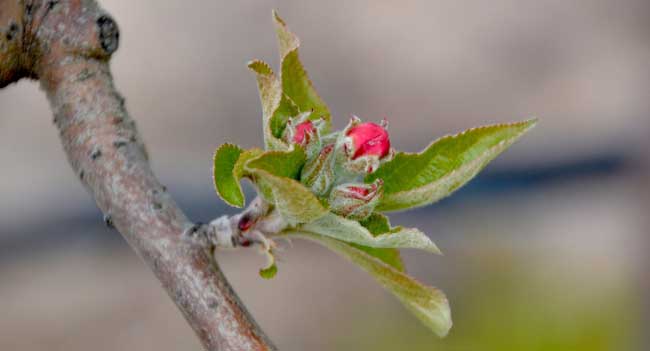Farmers say stretch of cold weather expected to damage apple crop
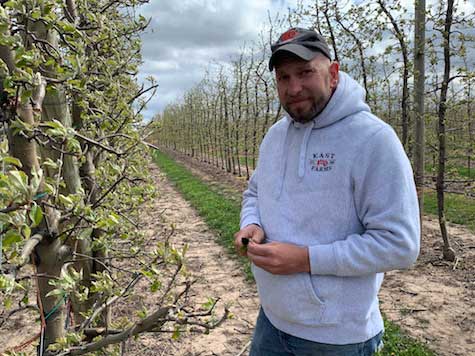
Brett Kast, co-owner of Kast Farms and the orchard manager, checks the apple buds for damage at an orchard on Lattin Road in Gaines.
ALBION – The freezing temperatures is causing high anxiety for local fruit growers who fear the cold will hurt their apples, blueberries and cherries.
Those fruit crops are in the bud and blossom stage, a vulnerable time to be exposed to prolonged cold.
Farmers already are seeing bud damage from the night-time freeze about a week ago. Brett Kast, co-owner of Kast Farms in Albion, showed some of that damage today. He cut into buds and could see black spots from the cold.
He also sees lots of buds that haven’t been hurt from the cold. If there is damage from the freeze last night and today it can take a few days for it to show. Kast also said farmers are worried about the cold weather forecast Monday night.
“We’ve had three events already so far,” Kast said about the frequent freezes in late April and May. “It stresses the trees.”
Most of the apple tree buds are still in the tight-cluster stage and haven’t started to blossom. That means they are more hearty and Kast expects they will withstand the cold and there will still be a good crop among the farm’s 450 acres of apples.
Orleans County is the third-leading apple-growing county in New York, behind Wayne and Ulster counties. New York state grows about 30 million bushels of apples annually, second in the country behind only Washington State.
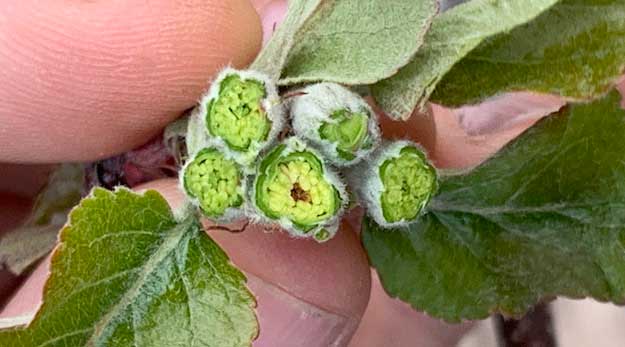
Brett Kast sees some damage in these buds, especially the center king blossom. The black spot shows damage likely caused by the overnight freeze about a week ago. It usually takes a few days for damage to show from cold temperatures.
There will be some damage locally to the fruit crop but it could be made up for as part of the normal thinning of apples later in the season.
Mike Zingler of Zingler Farms in Kendall is still opmtistic. The temepratures have stayed above 28-29 degrees, where apples in the budding stage can see more widespread damage.
“I think there is potential for a full crop,” he said today.
The trees tend to produce “way too many buds” so some damage isn’t disastrous.
Zingler has nearly 400 acres of apples in Kendall, Hilton and Holley. He is fairly close to the lake, which tends to be a buffer from a deep freeze in the spring.
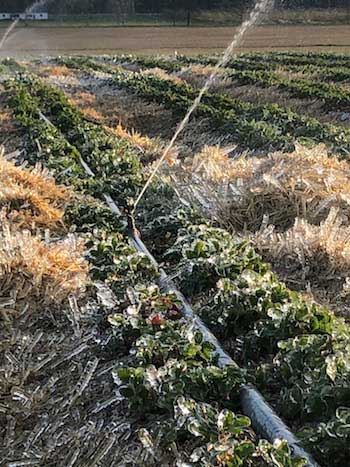
Photos courtesy of Eric Brown: Orchard Dale Fruit Company sprayed its berries. The farm used a freeze-and-thaw cycle to force the berries to give off energy, which helped them stay warm on a cold day.
Normally the trees would be very close to bloom stage, but the chilly April and May have slowed that down. The trees seemed ahead of normal schedule because it was warmer in March.
That isn’t good for fruit growers to have a warm March because the trees can start the budding and blossoming process early, making them very vulnerable if there is a frost later in the spring.
“It was set to be dangerously early,” Zingler said. “But then with the temperatures in the 40s, they just sat there. They’re languishing right now.”
Once the weather warms up, Zingler expects the trees will soon be in blossom stage for the important pollination. Farmers will be able to make a better assessment if their crop in June after pollination.
“In normal weather we would be five days from blooming,” Zingler said. “But April and March have flipflopped the last couple years. We just need some heat to move them along.”
Zingler said the trees still have many good buds, despite the cold weather. But he said the cold has killed some buds, and the surviving buds may result in misshapen apples and others with blemishes that don’t meet the standards for the fresh market. They might instead go for applesauce, juice or may not be picked at all.
“There is definitely damage,” Zingler said. “There is potential for more damage. We have to get through bloom to see what kind of crop we have.”
While the apples are hearty and can withstand a lot of the cold, other fruits are more susceptible to freeze, such as cherries and peaches.
Eric Brown, co-owner of Orchard Dale Fruit Company, said the multiple days of cold is unusual and will result in damage.
Orchard Dale worked all night last night to protect its blueberries, which are sensitive to frost. It make seem counterintuitive, but Orchard Dale sprayed the blueberries with water so they would get a coating of ice. That ice then thawed, and the farm sprayed on more water. Brown said the freeze and thaw makes the blueberries use energy, which produces heat. That actually helps the blueberries fight off the cold.
“The last six weeks it has been cold,” Brown said. “In March we felt like spring was right around the corner, but this has just put the brakes on it.”
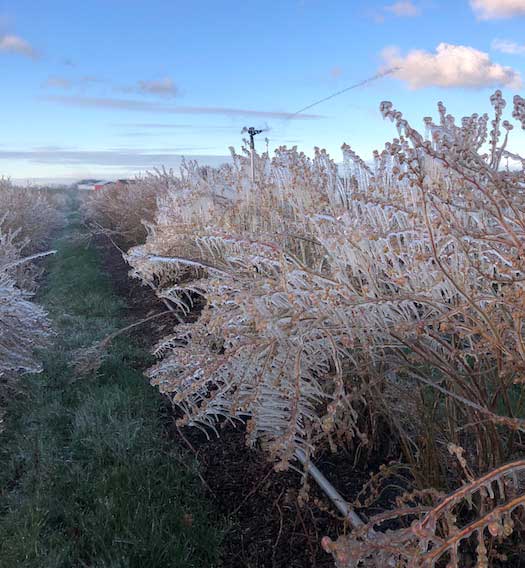
The farm used a sprayer to water the blueberry plants. The plants were coated with ice which actually provides some protection for the crops. As the ice freezes, it gives off heat to keep the buds from dropping below 32 and freezing.
Brown said a degree or two could make a huge difference in protecting the buds and blossoms.
That’s why he expects to utilize some old technology Monday night during the frost. He has pulled out the farm’s smudge pots, which function as an orchard heater. He thinks the apples and blueberries will be OK, but there will be some damage to the crop.
“We still have a couple cold nights yet to get through,” Brown said. “We’re going to have to keep on them.”





























